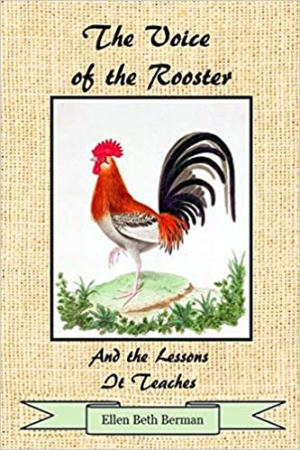The Voice of the Rooster
And the Lessons It Teaches
Warmth, love, and social awareness direct the poems of The Voice of the Rooster, a collection that champions the religiosity of living simply.
In plain language, Ellen Beth Berman’s reflective poetry collection The Voice of the Rooster treats life, people, and God’s plan with curiosity.
Living an ordinary life, from the book’s perspective, is an effortless way to fulfill God’s purpose. With this in mind, its poems focus on emotions and social relationships. Photographs, paintings, and graphics by other artists accompany each poem, suggesting additional symbolism; Berman’s notes further philosophize on poetic meanings.
“Lessons of the Rooster” urges conviction and perseverance, no matter what others might say in life, declaring:
Crow with conviction.
Take pride in your mission.
Do not let having to scratch the dirt for food, define you.
Remember your worthiness is not a question, just act.
Symbolic allegories and metaphorical images arise in poems like “Unmasking Truth,” about the masks that people don in everyday life to obscuring themselves from others. Figures including Icarus and Don Quixote are referenced to emphasize the downfalls of arrogance and delusion. And emotions and analysis are centered in entries like “Held Prisoner,” which critiques pride as consuming, even to the point of permitting the neglect of one’s friends:
Ego besieges me with its cruel insults
Often about being too restrictive or soft
And when I try to use it for making decisions
The validity of my choices is repeatedly off…
It often tells me quite emphatically
“You are the center of this grand universe!”
But when friends, rightfully, take exception
“Avoid them all!” warns ego, to be perverse.
Throughout, the book suggests God as a guiding light through dark times. The divine is forwarded as a source of clarity and truth for those in personal turmoil. Haunting imagery is used to further this mood: in “A Lonely Room,” a woman who is depressed and craving a savior walls herself off from life, and finds the place within herself “At first… extremely unnerving / Like a faucet dripping when trying to sleep / Playing upon some forgotten part of me.” Elsewhere, “Awaiting You” concerns the love and affection that a parent feels for a child taking its first steps; the child’s godly characteristics are named to complement this admiration.
While the entries are organized into sections modeled after the life of a rooster, this is a misleading structure, given the general lack of emphasis on that image throughout. And the book leans into its visual conventions too heavily, from how stanzas are spaced to where poems are interrupted by outside illustrations. Further, there are distracting shifts in the size of the book’s fonts, and some lines are placed in bold print, overemphasizing their meanings.
Warmth, love, and social awareness direct the poems of The Voice of the Rooster, a collection that champions the religiosity of living simply.
Reviewed by
Ali Ortiz
Disclosure: This article is not an endorsement, but a review. The publisher of this book provided free copies of the book and paid a small fee to have their book reviewed by a professional reviewer. Foreword Reviews and Clarion Reviews make no guarantee that the publisher will receive a positive review. Foreword Magazine, Inc. is disclosing this in accordance with the Federal Trade Commission’s 16 CFR, Part 255.

